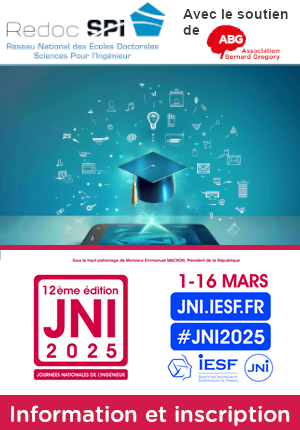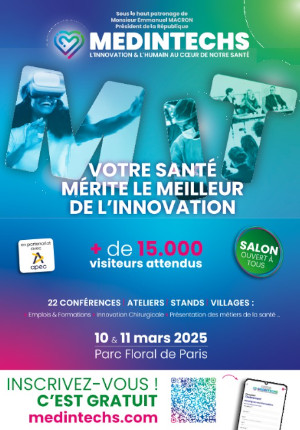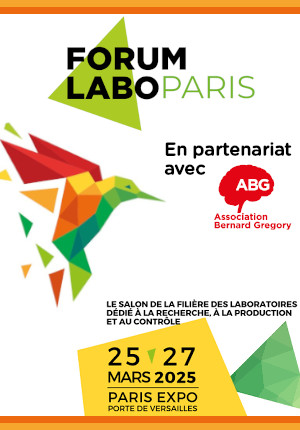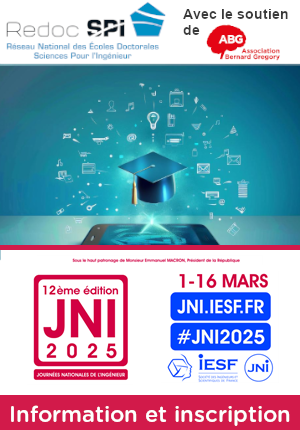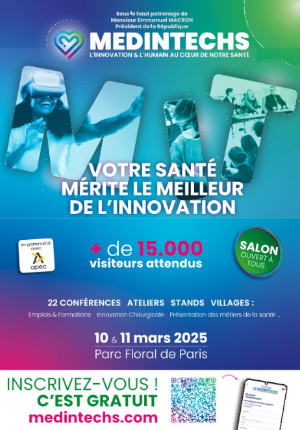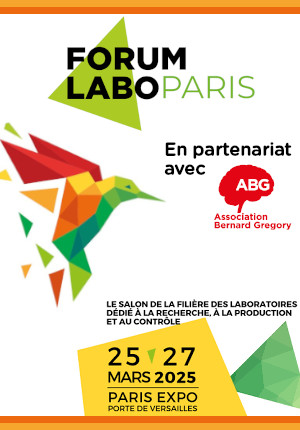Intégration de la redirection écologique en conception de systèmes mécaniques // Integration of ecological redirection in the mechanical systems design process
|
ABG-128743
ADUM-61492 |
Thesis topic | |
| 2025-02-19 | Public funding alone (i.e. government, region, European, international organization research grant) |
Université Grenoble Alpes
GRENOBLE Cedex 1 - France
Intégration de la redirection écologique en conception de systèmes mécaniques // Integration of ecological redirection in the mechanical systems design process
- Electronics
Génie industriel, Soutenabilité forte, Systèmes de production soutenable, Conception intégrée, Redirection écologique, Accompagnement au changement
Engineering Design, Strong Sustainability, Sustainable Production Systems, Integrated Design, Ecological Redirection, Change Management in Industry
Engineering Design, Strong Sustainability, Sustainable Production Systems, Integrated Design, Ecological Redirection, Change Management in Industry
Topic description
Cette thèse vise à appliquer le concept de 'redirection écologique des systèmes de production' en industrie de systèmes mécaniques, en prenant comme cas d'application des entreprises avec différents degrés de maturité dans leurs transformations, afin de formaliser une méthode intégrée en conception levant différents verrous au cours des étapes de transformation. La redirection écologique est un concept relativement récent qui vise à accompagner une entreprise attachée à un secteur industriel à des modèles de production soutenables, compatibles avec les limites planétaires, tout en tenant compte des enjeux sociaux et économiques au niveau du périmètre couvert et de la chaine de valeur impliquée dans ces transformations.
Le projet de thèse consistera à réaliser dans un premier temps un état de l'art sur les méthodes adaptées aux entreprises pour la transition vers une société soutenable, appelée redirection écologique. Dans l'activité du concepteur, ces stratégies se déclinent par des indicateurs d'objectifs environnementaux (ex. : viser la neutralité carbone en 2050) aux conséquences socio-techniques et économiques. Pour que la prise de décision des concepteurs soit alignée avec la stratégie de transformation écologique de l'entreprise, des travaux de recherche émergent en utilisant les méthodes d'analyse de cycle de vie absolue de changement d'échelle, c'est à dire, en intégrant la contrainte de limites au niveau planétaire, telle que la méthode EAU [Riondet 2024]. Ainsi la question soulevée est de comprendre comment l'appliquer pour aider les concepteurs à piloter et gérer (conduite du changement) la redirection écologique à court, moyen termes de leur entreprise.
La thèse proposera donc de développer une méthodologie intégrée pour accompagner cette transformation, en s'appuyant sur des concepts comme la soutenabilité absolue, la réduction d'échelle (downscaling) et des principes de répartition des limites planétaires. En combinant état de l'art théorique, approches multidisciplinaires et études ethnographiques dans des cas concrets de production, ce travail ambitionne de proposer un cadre opérationnel pour guider les acteurs industriels vers une transition écologique soutenable.
Ces travaux s'inscrivent dans les perspectives de recherche de la conception intégrée pour la permacircularité formalisées dans l'habilitation à diriger les recherches de Maud Rio de ce début d'année 2025 (IMEP2), et constitueraient à tracer un axe de recherche innovant et porteur de sens pour les années à venir dans sa carrière d'enseignant-chercheur au sein de l'Université Grenoble Alpes.
------------------------------------------------------------------------------------------------------------------------------------------------------------------------
------------------------------------------------------------------------------------------------------------------------------------------------------------------------
The central objective of this thesis is to operationalise the concept of 'ecological redirection of production systems' in the mechanical systems industry. To this end, companies with varying degrees of maturity in their transformations will be used as a case study, with a view to formalising an integrated design method that removes various obstacles during the transformation stages. The concept of ecological redirection, a relatively recent one, aims to support companies in industrial sectors in transitioning towards sustainable production models that are compatible with planetary limits, whilst considering the social and economic issues pertinent to the scope of the project and the value chain involved in these transformations.
The PhD project will initially entail a review of existing methods adapted to companies for the transition to a sustainable society, known as ecological redirection. In the designer's activity, these strategies take the form of environmental objective indicators (e.g. aiming for carbon neutrality by 2050) with socio-technical and economic consequences. In order to ensure that designers' decision-making is aligned with the company's strategy for ecological transformation, research is emerging that utilises absolute life cycle assessment methods for change of scale. This involves integrating the constraint of limits at a planetary level, as exemplified by the EAU method [Riondet 2024]. The central question guiding this research is how to apply these methods to assist designers in steering and managing (change management) the short- and medium-term ecological reorientation of their company.
The thesis will propose the development of an integrated methodology to support this transformation, based on concepts such as absolute sustainability, downscaling and principles for the distribution of planetary limits. The objective of this work is to propose an operational framework to guide industrial players towards a sustainable ecological transition. This will be achieved by combining theoretical state-of-the-art, multidisciplinary approaches and ethnographic studies of concrete production cases.
------------------------------------------------------------------------------------------------------------------------------------------------------------------------
------------------------------------------------------------------------------------------------------------------------------------------------------------------------
Début de la thèse : 01/10/2025
Le projet de thèse consistera à réaliser dans un premier temps un état de l'art sur les méthodes adaptées aux entreprises pour la transition vers une société soutenable, appelée redirection écologique. Dans l'activité du concepteur, ces stratégies se déclinent par des indicateurs d'objectifs environnementaux (ex. : viser la neutralité carbone en 2050) aux conséquences socio-techniques et économiques. Pour que la prise de décision des concepteurs soit alignée avec la stratégie de transformation écologique de l'entreprise, des travaux de recherche émergent en utilisant les méthodes d'analyse de cycle de vie absolue de changement d'échelle, c'est à dire, en intégrant la contrainte de limites au niveau planétaire, telle que la méthode EAU [Riondet 2024]. Ainsi la question soulevée est de comprendre comment l'appliquer pour aider les concepteurs à piloter et gérer (conduite du changement) la redirection écologique à court, moyen termes de leur entreprise.
La thèse proposera donc de développer une méthodologie intégrée pour accompagner cette transformation, en s'appuyant sur des concepts comme la soutenabilité absolue, la réduction d'échelle (downscaling) et des principes de répartition des limites planétaires. En combinant état de l'art théorique, approches multidisciplinaires et études ethnographiques dans des cas concrets de production, ce travail ambitionne de proposer un cadre opérationnel pour guider les acteurs industriels vers une transition écologique soutenable.
Ces travaux s'inscrivent dans les perspectives de recherche de la conception intégrée pour la permacircularité formalisées dans l'habilitation à diriger les recherches de Maud Rio de ce début d'année 2025 (IMEP2), et constitueraient à tracer un axe de recherche innovant et porteur de sens pour les années à venir dans sa carrière d'enseignant-chercheur au sein de l'Université Grenoble Alpes.
------------------------------------------------------------------------------------------------------------------------------------------------------------------------
------------------------------------------------------------------------------------------------------------------------------------------------------------------------
The central objective of this thesis is to operationalise the concept of 'ecological redirection of production systems' in the mechanical systems industry. To this end, companies with varying degrees of maturity in their transformations will be used as a case study, with a view to formalising an integrated design method that removes various obstacles during the transformation stages. The concept of ecological redirection, a relatively recent one, aims to support companies in industrial sectors in transitioning towards sustainable production models that are compatible with planetary limits, whilst considering the social and economic issues pertinent to the scope of the project and the value chain involved in these transformations.
The PhD project will initially entail a review of existing methods adapted to companies for the transition to a sustainable society, known as ecological redirection. In the designer's activity, these strategies take the form of environmental objective indicators (e.g. aiming for carbon neutrality by 2050) with socio-technical and economic consequences. In order to ensure that designers' decision-making is aligned with the company's strategy for ecological transformation, research is emerging that utilises absolute life cycle assessment methods for change of scale. This involves integrating the constraint of limits at a planetary level, as exemplified by the EAU method [Riondet 2024]. The central question guiding this research is how to apply these methods to assist designers in steering and managing (change management) the short- and medium-term ecological reorientation of their company.
The thesis will propose the development of an integrated methodology to support this transformation, based on concepts such as absolute sustainability, downscaling and principles for the distribution of planetary limits. The objective of this work is to propose an operational framework to guide industrial players towards a sustainable ecological transition. This will be achieved by combining theoretical state-of-the-art, multidisciplinary approaches and ethnographic studies of concrete production cases.
------------------------------------------------------------------------------------------------------------------------------------------------------------------------
------------------------------------------------------------------------------------------------------------------------------------------------------------------------
Début de la thèse : 01/10/2025
Funding category
Public funding alone (i.e. government, region, European, international organization research grant)
Funding further details
Concours pour un contrat doctoral
Presentation of host institution and host laboratory
Université Grenoble Alpes
Institution awarding doctoral degree
Université Grenoble Alpes
Graduate school
510 I-MEP² - Ingénierie - Matériaux, Mécanique, Environnement, Energétique, Procédés, Production
Candidate's profile
Diplôme d'ingénieur en génie mécanique et Diplôme de master en ingénierie et management de l'environnement et du développement durable. Compétences en ethnographie et en sociologie seraient un atout supplémentaire.
Engineering degree in mechanical engineering and master's degree in engineering and management of sustainable development and the environment. Skills in Ethnography research and in Sociology would be welcome.
Engineering degree in mechanical engineering and master's degree in engineering and management of sustainable development and the environment. Skills in Ethnography research and in Sociology would be welcome.
2025-05-12
Apply
Close
Vous avez déjà un compte ?
Nouvel utilisateur ?
More information about ABG?
Get ABG’s monthly newsletters including news, job offers, grants & fellowships and a selection of relevant events…
Discover our members
 TotalEnergies
TotalEnergies  ADEME
ADEME  Aérocentre, Pôle d'excellence régional
Aérocentre, Pôle d'excellence régional  Ifremer
Ifremer  ANRT
ANRT  Institut Sup'biotech de Paris
Institut Sup'biotech de Paris  CASDEN
CASDEN  PhDOOC
PhDOOC  Généthon
Généthon  Groupe AFNOR - Association française de normalisation
Groupe AFNOR - Association française de normalisation  SUEZ
SUEZ  MabDesign
MabDesign  CESI
CESI  ONERA - The French Aerospace Lab
ONERA - The French Aerospace Lab  Laboratoire National de Métrologie et d'Essais - LNE
Laboratoire National de Métrologie et d'Essais - LNE  Institut de Radioprotection et de Sureté Nucléaire - IRSN - Siège
Institut de Radioprotection et de Sureté Nucléaire - IRSN - Siège  MabDesign
MabDesign  Tecknowmetrix
Tecknowmetrix  Nokia Bell Labs France
Nokia Bell Labs France



